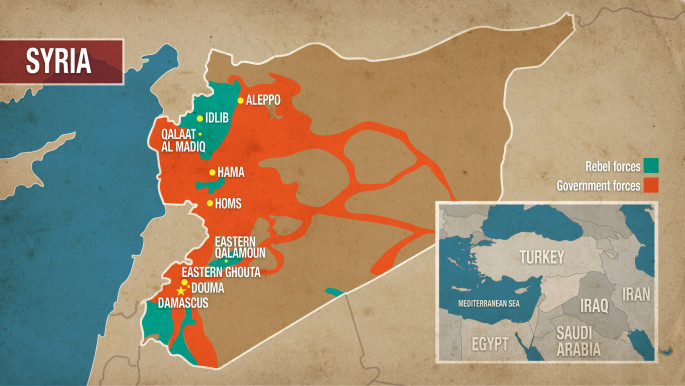Syrian regime retakes region outside capital from rebels
Syria’s regime on Wednesday moved to tighten its grip on the capital as it retook a region outside Damascus from rebels and pounded southern districts to oust militants.
In the town of Douma retaken more than a week ago, global chemical weapons experts visited a second site after an alleged toxic gas attack there on April 7.
Seven years into the civil war, President Bashar al-Assad’s regime has ramped up efforts to secure the capital with backing from ally Russia.
The regime took control of Eastern Qalamoun northeast of the capital Wednesday, state media said, after the last rebels left on buses under an evacuation deal.
At the same time, regime airstrikes and rocket fire pounded southern areas of the capital held by the Islamic State (IS) after regime raids there killed six civilians overnight.
The retaking of Eastern Qalamoun follows the latest in a string of deals between opposition fighters and the regime for rebels to withdraw from areas near the capital.
“The operation to bring terrorists with their families out of the areas of Eastern Qalamoun has ended and the region is free of terrorism,” state television said, using its usual term for rebels.
Government security forces entered the region’s town of Al-Ruhayba, some 60 kilometers northeast of Damascus, after the last rebels departed, it said.
Earlier this month, Assad’s forces announced their reconquest of the key rebel bastion of Eastern Ghouta east of the capital, after a blistering offensive and evacuation deals that saw thousands of people transferred to northern Syria.
Rebels withdrew from its main town of Douma last, after medics and rescuers said more than 40 people were killed on April 7 in an alleged chlorine and sarin attack in the town. Damascus has rejected the accusations as “fabrications,” but invited the global chemical weapons watchdog to visit the town.
“Today, the FFM [fact-finding mission] team carried out a visit to a second location in Douma. It also collected samples at this site,” the Organization for the Prohibition of Chemical Weapons said Wednesday.
Meanwhile, the Syrian government has yet to allow UN humanitarian assistance to enter Douma, where 70,000 people are in dire need of aid, according to U.N. deputy aid chief Ursula Mueller.
“After seven years of conflict that continues to see escalation after escalation, the needs of Syrians have never been higher,” Mueller told the UN Security Council.
In the south of the capital, regime airstrikes late Tuesday killed six civilians in the Palestinian camp of Yarmouk, the Syrian Observatory for Human Rights said. The latest deaths bring to 19 the total number of civilians killed in regime bombardment on the capital’s south since Thursday last week, the Observatory said.
Yarmouk – now IS’s last urban redoubt in Syria or Iraq – was once Syria’s biggest Palestinian refugee camp, home to around 160,000 people.
But the United Nations’ agency for Palestinian refugees, UNRWA, said most of the 6,000 refugees still living in the camp last week have since fled and just a few hundred remain. UNRWA commissioner-general Pierre Krahenbuhl said Palestinian refugees in Syria were living for the second time in their history as a community “the trauma of displacement.”
Since April 19, at least 61 pro-regime fighters and 49 militants have been killed in the capital’s southern suburbs, the Observatory says.
There are an estimated 1,000 IS militants left inside Yarmouk and the adjacent districts of Al-Hajar al-Aswad and Qadam. IS has lost much of the land it once held after sweeping across large parts of Syria and neighbouring Iraq in 2014, but has managed to stay on in Yarmouk.
In northern Syria, a final convoy carrying hundreds of fighters and civilians from Eastern Qalamoun was heading to the region of Afrin held by pro-Turkey rebels, the Observatory and a rebel commander said.
Last month, Ankara-led forces seized Afrin from Kurdish fighters whom Turkey considers to be “terrorists,” after an almost two-month assault that forced tens of thousands of civilians from their homes.
The Observatory says three of the convoys that have left Eastern Qalamoun since Saturday went to the Afrin region.
Syria expert Fabrice Balanche said the new arrivals are tantamount to “population replacement” – albeit without the regime’s agreement.
“Turkey is ousting the Kurds from the region and settling people it considers to be more reliable” there, he said.


![Palestinians mourned the victims of an Israeli strike on Deir al-Balah [Getty]](/sites/default/files/styles/image_684x385/public/2024-11/GettyImages-2182362043.jpg?h=199d8c1f&itok=xSHZFbmc)


![The law could be enforced against teachers without prior notice [Getty]](/sites/default/files/styles/image_684x385/public/2178740715.jpeg?h=a5f2f23a&itok=hnqrCS4x)
 Follow the Middle East's top stories in English at The New Arab on Google News
Follow the Middle East's top stories in English at The New Arab on Google News

![Palestinian journalists in West Bank [Getty]](/sites/default/files/styles/image_330x185/public/2167088057.jpeg?h=a5f2f23a&itok=smdkN-46)
